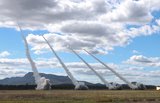Australia looks towards space with force restructure, investment and training
Australia is looking to improve its presence in space with a focus on communications and creating a dedicated segment of its defence forces committed to the domain.
Secure information sharing is clearly a prime concern for the UK government in this time of ‘huge challenge’ for security considerations to be included in the recent strategic defence review, the 2011 Defence IT conference was told on 13 April.
Speaking at the conference in Bristol, Derek Marshall, managing director of policy and public affairs for trade organisation A/D/S, outlined industry’s point of view of the hotly-discussed Strategic Defence and Security Review (SDSR) released in October.
Marshall said one often overlooked fact was that this was the first review of its kind that included security, and not just defence.
‘Perhaps less talked about is the fact that there was a second ‘s’there for security. It’s the first time that we’ve had a defence and security review,’ Marshall stated.
He argued that since the new UK coalition government came into power in May 2010, there has been a ‘very new government, learning a very new trade in a dramatically different market’.
For example, there are now some 110 public sector customers in the security market, opposed to one for defence.
Marshall commented that while secure information sharing was a prime concern, the ‘implications of that have not really been worked through’. However, it was understood that the government aimed to form a new counter-terrorism strategy, which would encompass information security, and a new document would be released in due course.
Although the financial deficit residing over the UK’s defence budget is of key concern, Marshall pointed to prime minister David Cameron’s statement that spending on defence will be allowed to rise in real terms after 2015 to help develop the capabilities desired under the ‘Future Force 2020’ concept.
‘I can guarantee that A/D/S will be doing its best to remind the Prime Minister and the government of that statement.’
The security of the information shared within the defence industry was a key theme of the conference. One industry representative argued that the controversy surrounding the recent Wikileaks scandal is making a lot of people think twice about information sharing.
‘We have laptops where we can’t actually store our presentations. The consequence of that is we have memory sticks, which people can then lose, and so the consequence of actually trying to secure things by making them more secure on the laptop, all you’ve actually done is make them much more vulnerable,’ the industry representative said.

Australia is looking to improve its presence in space with a focus on communications and creating a dedicated segment of its defence forces committed to the domain.

The Portuguese company’s naval communications system is in service across more than a dozen countries. It has turned to its home nation for support in developing a new vehicle based C2 system.

The Vision4ce Deep Embedded Feature Tracking (DEFT) technology software is designed to process video and images by blending traditional computer vision with artificial intelligence (AI) algorithms to present actionable information from complex environments.

Persistent Systems has been cleared by National Security Agency (NSA) to transmit sensitive data on commercial networks. The devices are added to the NSA’s Commercial Solutions for Classified (CSfC) component list which also includes other companies’ products providing the same security.

The release of the UK’s Strategic Defence Review (SDR) has been long promised as mid-year. It is possible it could be as early as 2 June although the UK Ministry of Defence (MoD) continues to play its cards close to its chest.

Intelsat outlines how its multi-orbit SATCOM architecture is enhancing connectivity and resilience for special operations forces operating in degraded and contested environments.